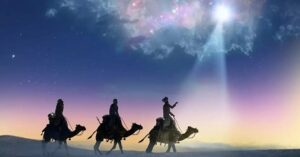This is Faith in Play #74: Preparation, for January 2024.
For most of us, Christmas is over. When I was a boy, our tree and decorations went up shortly after Thanksgiving, and on New Year’s Day everything came down and was packed away, the tree burned in the fireplace as part of the New Year celebration. (I can see that being perceived as having significance as part of the old year passing, but that point was never suggested.) Our house is different today–my wife grew up with the tradition that Santa brings the tree on Christmas Eve, and for many years we undertook the arduous task of staying up all night making Christmas happen after children were in bed. Although as we and they have gotten older we start earlier in the day, once it’s up it stays up frequently into the beginning of March, particularly since allergies have forced us to an artificial tree that someone gave us a few years back. We, though, are an exception; Christmas is over for most of you–and it is not quite Epiphany.

I recently heard the suggestion that one reason Christmas is so tiring for so many people is that in modern times we are packing so much celebration into so short a time. Our ancestors reportedly began preparing and celebrating–each part of the other–by early November or even late October, and continued well into February or March. Even within my lifetime for many the celebration began with the first Sunday of Advent, four weekends before Christmas Eve, and often ran into Epiphany, celebration of the arrival of the Wise Men late in the first week of January. A major holiday was a major celebration that lasted considerably longer than one day.
Our modern view tends to relegate holy days to single days–but that’s not exclusively so. In New Orleans some are already beginning their celebration of Mardi Gras–French for Fat Tuesday, the day before Ash Wednesday on which everyone massively pigs out in anticipation of the beginning of the forty-day fast that is Lent. Someone at some time decided that some recognitions were so important they needed their own month, and so by now nearly every month has been given to one cause or another, some to more than one. However, when we design our worlds, we tend to think like moderns: this is the day on which these people celebrate X, no consideration of whether they have been anticipating this for a day or a week or a month in advance. A celebration day is a drop in the bucket of a year. If something matters, the celebration is going to be big, and is going to overflow the boundaries of twenty-four hours.
And something about that makes the celebration seem more important.
If you want the religion or religions of your world to seem important to the people, obviously you need holidays (and decades back I compiled a list of holidays used by several game masters running various games or adapted from elsewhere to provide fodder for creating your own). Yet you may also want to give some of those events greater significance by stretching the celebration over a longer period. We celebrate the birth of Jesus because for us the fact that God became man is one of the most important in history (even if we don’t really know when that is), and we celebrate His death and resurrection for the same reason. These celebrations span longer periods precisely because the events they commemorate are that important. That should be natural in your game worlds, as well, and give you the opportunity to underscore what is important to your people.
Previous article: Pilgrimage.
Next article: Tourette’s.
